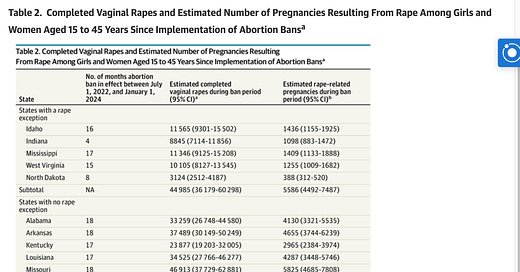This week, a Research Letter in JAMA Internal Medicine reported that there have been an astonishing 64,565 pregnancies during the 4-18 months that bans were in effect in 14 US states with total abortion bans.
Many US women report experiencing sexual violence, and many seek abortion for rape-related pregnancies. Following the US Supreme Court’s 2022 Dobbs v Jackson Women’s Health Organization (Dobbs) decision overturning Roe v Wade, 14 states have outlawed abortion at any gestational duration. Although 5 of these states allow exceptions for rape-related pregnancies, stringent gestational duration limits apply, and survivors must report the rape to law enforcement, a requirement likely to disqualify most survivors of rape, of whom only 21% report their rape to police.3
In the 14 states that implemented total abortion bans following the Dobbs decision, we estimated that 519 981 completed rapes were associated with 64 565 pregnancies during the 4 to 18 months that bans were in effect (Table 2). Of these, an estimated 5586 rape-related pregnancies (9%) occurred in states with rape exceptions, and 58 979 (91%) in states with no exception, with 26 313 (45%) in Texas.
Nonetheless, the large number of estimated rape-related pregnancies in abortion ban states compared with the 10 or fewer legal abortions per month occurring in each of those states indicates that persons who have been raped and become pregnant cannot access legal abortions in their home state, even in states with rape exceptions.
As a practical matter, abortion exceptions do not exist:
Few states with total bans on abortion have exceptions for rape. Those that have exceptions require victims to report the rape to authorities, something that research shows happens only in a small fraction of sexual assaults. NPR
As the New York Times reported, Most Abortion Bans Include Exceptions. In Practice, Few Are Granted. “Across the state, the attitude about abortion is: We don’t do that here.” The exceptions don’t matter if you cannot find a clinic that is willing to provide an abortion.
There’s a reason that conservatives consistently downplay how many women and girls are raped: They know that Americans very much oppose sexual violence victims being forced into childbirth. Anti-abortion lawmakers and activists believe that if they pretend rape-related pregnancy—or rape, in general—is rare, they can hide their extremism.
But the truth is that these people don’t want anyone to be able to have an abortion, ever. Not if they’re a rape victim, not if they’re a child, not if their life is in danger. (Yes, even those who back ‘exceptions’; they know they’re not real.) That’s why Republicans’ only messaging recourse has been saying over and over again that cases like these almost never happen.
Some even claim that women can’t get pregnant from a rape. Students for Life president Kristan Hawkins, for example—who has been celebrated as the future of the anti-abortion movement—says that “sexual assault actually helps prevent a lot of pregnancies itself because of your body’s natural response.” Jessica Valenti
As physicians, we have a responsibility to protect our patients. In the post-Dobb’s era, we must be politically active, supporting candidates and organizations that promote the reproductive health care of women and girls. In 2024, that means supporting Democrats - it is difficult to find a Republican candidate or public official who consistently supports abortion rights; many do not even support IUDs or hormonal birth control.
If you like these free essays, please share them with others.
Follow me on Substack or LinkedIn. I have another blog on Cancer and Medicine.
Email me at Nat@PathologyOutlines.com.
I also publish Notes at https://substack.com/note. Subscribers will automatically see my notes.
Other social media - Tribel: @nat385440b, Threads: npernickmich





